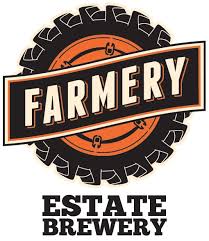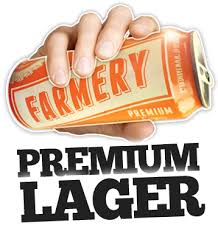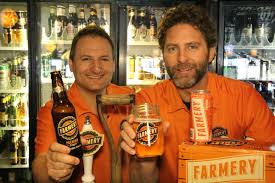 This is an odd profile for me to write. Normally I write about breweries that have just opened or are still in the planning stages. Farmery Estate Brewery has been around for six years or so, at least in a virtual, contract-brewing form. These days they are a full-fledged, real brewery in Manitoba.
This is an odd profile for me to write. Normally I write about breweries that have just opened or are still in the planning stages. Farmery Estate Brewery has been around for six years or so, at least in a virtual, contract-brewing form. These days they are a full-fledged, real brewery in Manitoba.
I should have written about them years ago, but somehow didn’t. My bad. But allow me to correct that mistake today. My friends, Farmery Estate Brewery is real and has designs on creating beer not only brewed locally but grown locally. And that is worth talking about.
Brothers Chris and Lawrence Warwaruk grew up in a farming family just outside Winnipeg. Like many farming families, the 1990s and 2000s were hard, forcing the brothers to contemplate other options. Their initial foray was in the restaurant business, opening the hip LuxSole in 1998. The money they made from the restaurant was fed into the family farm, saving it from bankruptcy. In 2008, they expanded their holdings by opening Luxalune Gastropub, which – as it worked out – introduced them to the world of craft beer.
Actually, the starting point for their affair with beer may have started with a trade mission in 2009. In my conversation with brother Chris, he tells me the request came out of the blue. “We somehow got invited to participate in a trade mission to Wisconsin to promote Manitoba farm products,” he says. At the time they were growing a particular strain of hay targeted at race horses. But Chris could tell the future was limited in that crop. “We told them that we actually were more interested in trying to figure out how to get into the beer business,” he says. The tour organizer heard him and promptly set him up to tour a variety of Wisconsin breweries during the mission. It was a fateful decision.
“It really opened our eyes. Pubs with 99 beer on tap, all made in Wisconsin,” Chris says. “The whole drive home the entire conversation was about how do we tap into the beer scene in Canada? It quickly became clear we needed to attach our farm roots to it as well, to bring something unique to the marketplace.”
So they made a couple of immediate decisions. First, they started shifting their farm production toward beer ingredients. “We switched to create a hopyard and grow barley. We educated ourselves on how to understand malt barley.”
 They also developed a beer brand and contracted with Muskoka Brewing in Ontario to produce a beer with which they could build brand name and market share. The beer, Farmery Premium Lager, was sold in cans across western Canada.
They also developed a beer brand and contracted with Muskoka Brewing in Ontario to produce a beer with which they could build brand name and market share. The beer, Farmery Premium Lager, was sold in cans across western Canada.
But that didn’t mean they were on easy street. The contract beer was just to create some initial awareness. “At first our plan was to force customers at LuxaLune to drink it and get feedback from them. After first batch, we didn’t look back. Their reaction convinced us. We got the stamp of approval from customers,”
At that point they went all in on trying to build a brewery at the same time as they shifted the farm to grow beer ingredients. “We were ready to jump in with both feet,” Chris admits. “We wold mortgage the house, take blood to the blood bank, whatever it takes build brewery as fast as we can.” At this point they have 20 acres of hops and about 200 acres of malt barley – not enough to supply the brewery but a good start.
One of their struggles is that, at the time, Manitoba had “no history of big, successful breweries”, making finding bank financing difficult. But the Warwaruk brother persevered. The Farmery brewery, located in Neepawa just west of Winnipeg and a short drive from the family farm, opened in September 2016. It is a 30-Barrel system with 7 double-sized fermenters and two bright tanks. Their brewmaster is recently arrived from Cameroon where he was brewer at a large commercial brewery in that country. He spent months helping the brothers on the farm making him “one of the few brewmasters with experience working in a hopyard”.
These days they are making a range of beer at the new brewery. In addition to the Premium Lager, they have created a Canadian Pale Ale (which is a Single Malt, Single Hop – SMASH – beer) and a variety of fruit inspired beer. Prairie Berry Ale is a blonde ale infused with raspberry, sour cherry and saskatoon berry. Pink Lemon Ale is a “pink lemonade beer” which Chris describes as “cooler-like and tastes unique with added flavourings.” They will be launching a Hard Ice Tea in the coming weeks. At the moment they also have a growler-only offering called Manitoba Wind Chill Lager, which uses Galena essential oils. Chris suggests “its aroma is flavourful and smells like IPA yet tastes like a hoppy lager,” made using hops from the farm.
 They are packaging in two different sizes of cans – the standard 355 ml and the larger 473 ml, along with participating in the Manitoba Liquor Commission’s growler fill program.
They are packaging in two different sizes of cans – the standard 355 ml and the larger 473 ml, along with participating in the Manitoba Liquor Commission’s growler fill program.
But the main focus of Farmery is its links between the farm and the brewery. “Our vision of adding value to what we do on the farm,” says Chris. He says they want as much of their ingredients as possible to be sourced from local farms, both theirs and others. “Too often in farming we talk about maximizing yield and minimizing risk. We don’t talk about value added. We are adding value by making beer from our barley.”
It is not just about the beer for the Warwaruk brothers. ” It is not just about brewing beer, but perfecting and expanding horizons. What can we do with the hops? Should pelletize or go with whole? Or maybe extraction?”
In the immediate future the brothers have a dual focus of extending the reach of the beer across the prairies and to “expand the hopyard” to see how much more they can harvest for the brewery.
It is hard enough to open a brewery in Canada. Imagine doing that at the same time as you are operating a farm designed to grow the ingredients for that beer. Hard, eh? Well, that is what the Warwaruk brothers are doing.


January 23, 2017 at 6:48 PM
Excuse me if i got this wrong but is this not the 2 guys who where on Dragon’s Den 2 or 3 years back looking for capitol for their brewery and I believe they went in with a bacon infused beer ? Anyhow if they are I am glad they did not sell the farm. So many great products yet so hard to find and try. YYY ? Thanks
January 23, 2017 at 7:14 PM
Farmery was on Dragon’s Den a couple years back – and got a deal – but their pitch was what they are doing – farm to glass. The brewery offering the bacon beer to the dragons was Hogsback Brewing out of Ottawa.